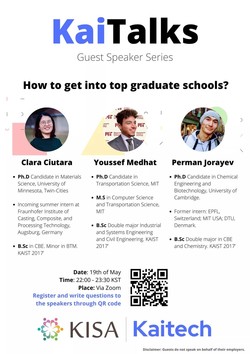
On May 19, KAITech, a student-run organization focused on exploring and promoting career opportunities for KAIST students, aired the second episode of KaiTalks series in collaboration with KAIST International Students Organization (KISA). The episode, titled “How to get into top graduate schools?”, features three KAIST alumni who are currently pursuing their graduate studies in high-ranking universities abroad. The guests talked about their experience applying to graduate schools and shared some tips regarding this process.
All of the speakers — Clara Ciutara, Youssef Medhat, and Perman Jorayev — graduated from KAIST in 2017 and are currently working towards their doctoral degrees. After receiving her BS degree in Chemical and Biomolecular Engineering (CBE), Ciutara got accepted to University of Minnesota, Twin-Cities, to study Materials Science. While at KAIST, she completed two exchange programs at Georgia Institute of Technology and Hong Kong University of Science and Technology. This summer, she will be interning as a researcher at Fraunhofer Institute of Casting, Composite, and Processing Technology in Ausuburg, Germany. The second speaker of the talk, Medhat, double majored in Industrial and Systems Engineering and Civil and Environmental Engineering as an undergraduate student, and proceeded to join MIT for his MS and PhD degrees. His current research revolves around transportation science. Last but not least, Jorayev, who double-majored in CBE and Chemistry, is now a PhD candidate at University of Cambridge. He also has experience interning at Swiss Federal Institute of Technology Lausanne, MIT, and Technical University of Denmark.
Throughout the talk, the guests stressed the importance of networking and talking to senior researchers about their experience to make sure that joining a graduate school is the right choice for someone. Pursuing a graduate degree is a big time commitment, and it might not be as lucrative as joining the industry straight after finishing one’s undergraduate studies. All of the speakers agreed that research experience, publications, and excellent recommendation letters from professors are more important than one’s GPA. Medhat said, “Having a good GPA is neither necessary nor sufficient to get into a graduate school.” He also mentioned that, in addition to showing competence as a researcher, one might increase his or her chances of getting accepted by demonstrating involvement in other university activities, or “university service”, as Medhat put it. He explained that as a researcher, one gets to do a number of things for the university, such as teaching, reviewing papers, and taking part in various committees, so it can be beneficial to show commitment to such activities during one’s undergraduate years. Along with discussing the factors that can influence one’s acceptance to a graduate school, the guests also shared their tips on how to find a suitable program and what to look for in a prospective school or laboratory.
You can access the full episode on YouTube through the following link. To watch the first episode, “How to start an SWE career at university?”, visit this link.

